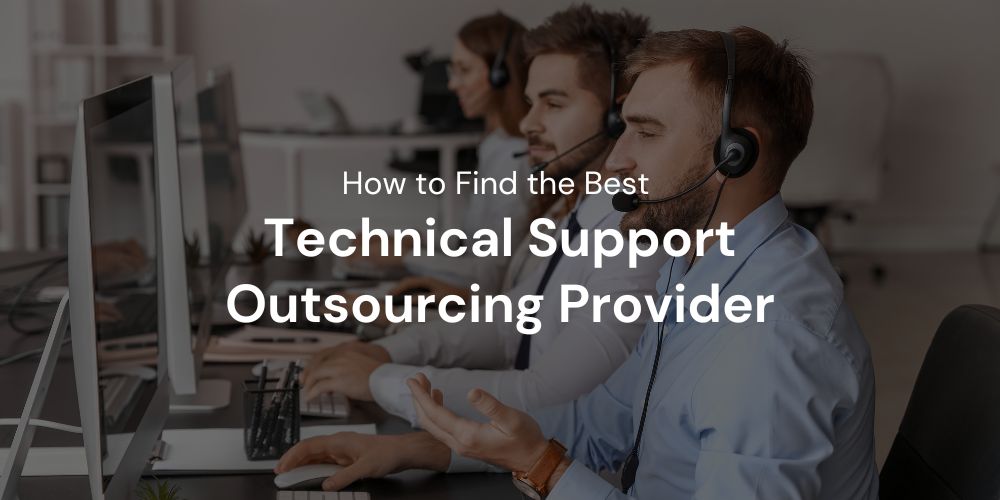How to Find the Best Technical Support Outsourcing Provider


How do you select the best technical support outsourcing provider for your company?
If you’re unsure, this blog post is for you.
Finding outsourced technical support provider is not difficult. You can find a plethora of service providers by searching the internet. They’re just a phone call or a mouse click away. The difficult part is deciding on the best one to get your money’s worth. You don’t want your first attempt to be costly, do you?
This article show the important factors to consider when outsourcing technical support.
Continue reading to find out more. Also, be sure to read our tips at the end.
Factors to Consider When Hiring a Technical Support Outsourcing Provider
An outsourced IT provider assists customers with product or service questions and concerns. It is also known as a technical support firm, a third-party vendor, or a business process outsourcing (BPO) firm. A service provider assigns a tech support or help desk team to its client’s information technology (IT).
There are thousands of IT support vendors in the BPO industry worldwide. Outsourced technical support is a back-office outsourcing function that is widely accepted as an effective business practice for increasing productivity and lowering costs. It is a significant differentiator that allows you to stand out from the crowd and succeed.
Investigate the three main factors to assist in locating the best technical support outsourcing provider. These are services, costs, and BPO firms. Let’s get started.
Look for Services That Meet Your Needs
Below are the four types of services to seek from a BPO provider.
1. International coverage and multichannel support
Choose a BPO company that offers global coverage, omnichannel services, and around-the-clock support.
Your customers must be able to contact the outsourced tech support team regardless of where they are—on a mobile device, at home, at the office, or elsewhere. They must also be able to reach out to the team at any time, including holidays, after hours, and on weekends.
Furthermore, consumers must use various communication platforms to suit their preferences. The greater their options, the better. Check that the service provider has the following channels:
- Phones (fixed lines and mobile)
- Social media
- Live chat
- Chatbots
- Knowledge base resources
- Self-service portals
A global reach with multiple channels and 24/7 support allows your company to enter new markets and establish an international presence. Here are 11 advantages of starting an international business.
- More repeat business results from improved customer retention and loyalty.
- Access to a wider range of technical talent to boost efficiency and productivity
- More potential customers for the brand in order to expand its consumer base
- Customer interaction that is seamless regardless of time, device, or location
- Quicker technical support without sacrificing quality
- Increased customer satisfaction and trust through improved customer experience
- Increased communication options for customer convenience
- Improved customer data and information collection for deeper insights
- Improved products or services as a result of more customer feedback
- With a new market covering lost revenue, there is more protection against weak local operations.
- Greater economies of scale lead to lower operating costs.
2. Compliance-focused Service
Look for a technical support outsourcing provider who offers data security and compliance services. Noncompliance with government regulations and industry standards can result in costly fines, severe penalties, reputational harm, and possible imprisonment.
Federal agencies and industry watchdogs protect the public from online intruders, hackers, and criminals who illegally access personal information. They ensure that laws and regulations are followed.
The following are five laws and standards that must be followed.
- Telemarketing and Consumer Fraud and Abuse Prevention Act. Federal law requires telemarketers to acquire a licensed certificate and legal permission to work. This act prevents telemarketing deception and malpractices.
- Health Insurance Portability and Accountability Act of 1996 (HIPAA). The federal regulation imposed on healthcare providers and practitioners protects patients’ health information from unauthorized release.
- International Organization for Standardization (ISO). The globally recognized independent entity with strict standards issues sought-after certification. An organization that meets its quality assurance needs receives an ISO certificate.
- General Data Protection Regulation (GDPR). The European Union regulation aims to protect consumer information. Companies with customers in the region must inform regulators about their data gathering.
- Payment Card Industry Data Security Standard (PCI DSS). The policy requires all businesses to secure credit card data to reduce credit card scams.
Quick tips for determining whether a BPO firm provides compliance and security services:
- Check whether it has advanced software to secure vital information
- Obtain its detailed online security policies.
- Determine whether it has a compliance or security team.
3. Multilingual Help Desk Support
To meet the technical support needs of international buyers, select a third-party vendor that offers multilingual services. Its IT team must be able to communicate in a language other than English. Examples include Portuguese, German, Spanish, Chinese, and Nihongo (Japanese).
Because bilingual talent is scarce, few BPO firms provide multilingual help desk support. However, non-English buyers and internet users are widespread, providing you with greater earning potential and a competitive advantage. They typically purchase and patronize products and services that deliver information and after-sales help in their native language.
Here are some things to consider when looking for multilingual customer service.
- Check to see if the service provider uses reliable translation software. The BPO company must publish information in multiple languages. It must have accurate auto-translation tools to convert text into the customer’s native language in real time.
- Examine the website of the BPO provider. Navigate its website to see if self-help options can be translated into multiple languages. Customers who do not speak English must be able to understand chatbots and frequently asked questions (FAQs).
- Examine the communication channels of the third-party vendor. If it has multilingual capabilities, look into its social media, live chat, email, and knowledge base. When selling to your target overseas market, these are effective channels.
- Learn about the cultural expertise of the BPO firm. Each country has its own communication preferences. Customers in Japan prefer to be addressed by their titles, whereas French buyers prefer phone interaction.
4. Fast Response Time Service
When outsourcing data entry, tech support, and other functions, choose a BPO firm that can complete the tasks quickly. The average time it takes for the team to respond to a user’s requests or concerns is referred to as response time. The customer makes contact with the team via phone, email, social media, or chat. A quick response time indicates that the BPO team is efficient and dependable.
Three advantages of quick response time are as follows.
- Increased customer loyalty. Quick service (with accuracy and high quality) demonstrates how much they care about consumer concerns. Loyalty will most likely result in additional purchases from the same buyers.
- Improved brand image. Rapid service enhances the brand’s reputation, giving it an advantage over competitors. It also enables customers to quickly identify your product or service and purchase it as soon as possible.
- Word-of-mouth marketing. Customers who receive prompt and efficient service are more likely to recommend it to others. They share it on social media, write positive reviews online, or leave positive comments on other websites.
Use the benchmarks below to find the best BPO company with a quick initial response time.
- For phone calls – a maximum wait time of three minutes is acceptable to most customers.
- For email – not exceeding four hours to reply to a request or concern is preferable.
- For social media – answering queries in less than five minutes is recommended.
- For live chat – responding in 45 seconds at the onset is considered excellent.
Request the most recent metrics demonstrating the performance speed of the potential service provider’s tech support team.

Find Reasonable Prices and Costs
Consider three price and cost factors before partnering with a technical support company.
1. Different Price Models
To get the best price for outsourced IT support functions, choose a BPO company that offers multiple pricing plans. Pricing that is flexible based on business conditions is an excellent option. It charges you more during periods of high sales and lowers its fees during periods of low sales.
Provide details of the potential income and losses from the outsourced operations to make flexible pricing acceptable to the third-party vendor. Being transparent by providing relevant and accurate revenue data will almost certainly lead to your partner accepting the terms.
The pricing packages that most BPO companies offer their clients are listed below.
- Performance-based – depends on the production
- Fixed price – fixed charges periodically
- Per-user fixed fee – based on the number of users
- Per-device flat fee – based on the number of devices
- Transaction-based – transaction volume determines service rates
- Ad hoc fee – per project basis fee
- Monitoring only – payment for network maintenance
2. Cost-effective Outsourcing Technical Support
Back-office outsourcing services lower operating costs. Delegating technical support tasks to a BPO firm is less expensive than managing an in-house technical support team. The majority of these outsourced activities are handled by teams based in BPO-friendly countries with a skilled and affordable workforce.
To get the most out of your outsourced venture, choose a BPO firm that is willing to bear the following costs in order to save you time, effort, money, and other resources:
- Recruitment. The BPO company handles talent scouting, preliminary screening, testing, interviewing, hiring, and training of technical support personnel.
- Infrastructure. The service provider manages the facilities or physical systems required to run the outsourced processes, including software, hardware, networking devices, and other necessary equipment.
Don’t forget to request documents demonstrating your prospective partner’s cost-cutting capabilities. Inquire specifically about how it intends to reduce your expenses.
3. Service Charge Transparency
Determine the total outsourcing costs early on so that you have enough time to plan for the correct budget. To determine whether the technical support outsourcing provider’s fees are reasonable, request a complete list of its:
- Rates
- Charges
- Hidden fees
- Fees that are not disclosed
- Additional costs
- Other cost-related information
It should be noted that service providers have different pricing plans. Its packages are determined by factors such as the client’s specific needs, company size, and work or call requirements.
Not all BPO companies disclose hidden fees at the outset. Work disruptions, extra-legal services, and employee termination may all result in unexpected costs.
Using these three steps, you can find the best price.
- Examine each prospect’s pricing scheme.
- Make a list of possibilities.
- Choose the one that best fits your budget and requirements.
Find Potential BPO Partners
Here are three characteristics to look for in a BPO provider.
1. Excellent Reputation
Choose one with a proven track record of working with well-known companies. A service provider with a good reputation is dependable. Use these tips to learn about its reputation in the industry and with customers.
- Conduct extensive research. Check unbiased online reviews for the BPO firm’s credentials and achievements. Clutch.co is an example of an independent platform that collects unbiased client feedback about each business listed on its website.
- Make contact with the BPO prospect. In order to assess tech support performance, production, and efficiency, request the prospect’s most recent key performance indicators (KPIs) and other metrics. Examine the average response time, resolution time, and customer retention rate.
Since 2009, Unity Communications, for example, has won global awards and collaborated with major corporations in the United States. It is in charge of outsourced data entry, accounting help desks, and customer service support.
2. Next-generation Technologies
Select a BPO provider who uses cutting-edge systems and applications to streamline processes. New help desk platforms make it easier for tech support specialists to manage high call and work volumes.
Furthermore, by automating common tasks, the latest platforms enable the IT team to handle customer concerns, complaints, and questions more efficiently. It becomes simple to oversee complex issues and expedite service in order to improve consumer service and satisfaction.
Examine whether the tech support team of the service provider employs secure cloud-based solutions. Connectivity, collaboration, customer service, and information delivery are all accelerated by technology. It unifies applications such as call center software, customer relationship management, and help desks. With this system, you can achieve greater power and speed.
Omnichannel communications, artificial intelligence (AI) and machine learning, multilingual and self-service support, and incident management software are other technologies to investigate.
3. Specialized Team
Ascertain that the technical support outsourcing provider has a team of specialists dedicated to the delegated IT tasks. Their primary responsibility is to consistently provide excellent customer service and satisfaction.
A specialized team is made up of people who are experienced, accurate, responsive, and empathetic. Request permission from the BPO partner to conduct background checks on team members. Each must possess the following seven characteristics:
- Active listening skills
- Teamwork
- Help desk software experience
- Proficiency in standard operating systems
- Problem-solving skills
- Organization skills
- Above-average analytical skills
Check with the BPO firm to see if it has a full staff of agents, engineers, consultants, and developers. Technical concerns and requests can be successfully addressed by a well-balanced team. Basic issues such as software installation and troubleshooting are handled by entry-level specialists. Meanwhile, complex tasks, such as designing security applications, are assigned to higher-level agents.
Bonus Tips
Here are some additional tips for finding a technical support outsourcing provider.
- Select an outsourcing method. If you want lower operating costs, pick offshoring or nearshoring. If you’re after better collaboration, go for onshoring (local outsourcing).
- Choose the appropriate size. Search for a BPO firm that is roughly your size for service priority. Hire a service provider with thousands of employees if you are a large organization with a large workload to outsource. Get a small or medium-sized one if you’re a startup.
- Set goals and business requirements first. Discuss the possibility of outsourcing technical support with other decision-makers and involved employees in your organization. Discuss critical issues such as team size, workloads, outsourcing types, and communication channels.
- Prefer a BPO company that has technical certifications. It is best to use a third-party vendor who has been accredited or certified by a government agency, academic institution, or industry association. Credentials demonstrate professionalism and effectiveness. Microsoft IT Support and HDI Customer Service Representative are some examples.
- Create a request for proposal (RFP). Draft this document containing the outsourcing requirements, including the budget, solutions, work scope, and time frame, to attract as many BPO prospects as possible. Send it to a number of service providers. The RFP attracts many bidders to help you get the best third-party vendor.
The Bottom Line
If you’ve made it this far, you should have a good understanding of outsourced support functions and what to keep in mind and do when looking for the best outsourcing partner.
Continue to do your homework. Outsourcing is a significant decision with long-term consequences. Before committing to a third-party service provider to assist with your back-end processes, make sure you’re well-informed.
Finally, conduct a cost-benefit analysis to determine whether outsourcing tech support functions or maintaining an in-house team saves money, time, and effort.
